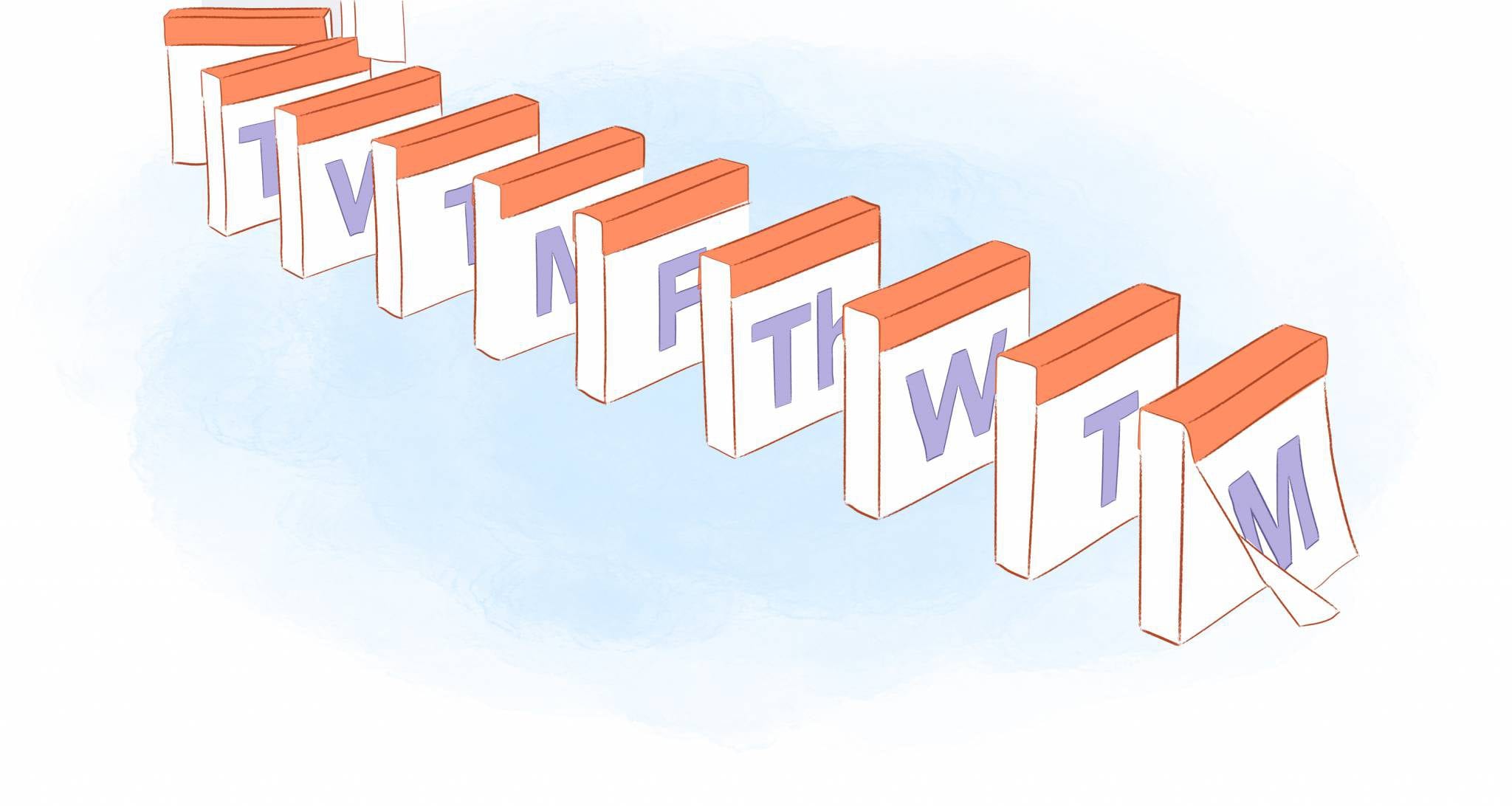

For many of us, the winter months are draining. Before we know it, our schedules are bogged down, and there doesn’t seem to be enough time in the day. On top of that, some people struggle with seasonal affective disorder, a type of mild depression that is common in the fall and winter months. Here are five ways to spring clean your schedule now.
Thankfully, spring is almost here. And just as you spring-clean your home, it’s the perfect time to reevaluate your schedule, to get rid of what doesn’t work, and make changes for the better.
1. Set Priorities.
Start by thinking through your priorities. What are the essential aspects of your life that keep you going? The specifics will be different from person to person, but generally, you have three main priorities: health, relationships, and purpose. Cut out whatever gets in the way of these priorities.
Health
Think about your health holistically. Use a journal to understand which foods and activities affect your physical, mental, and emotional health. Prioritize yourself by getting a sufficient amount of sleep, eating well, exercising, and practicing gratitude. These are things that you can’t afford to drop from your schedule.
Relationships
Invest in your relationships by spending quality time with the people that matter most in your life. Express what these people mean to you and show appreciation in verbal and nonverbal ways. Humans are social beings, so when you prioritize relationships, you will be happier.
Purpose
Your purpose is what keeps you going and pushes you toward success, so it’s important to know why you do what you do. Think about the ways in which you contribute to society. Consider your strengths and how your work utilizes them.
Think, too, about your personal passions. For example, if you love reading, don’t let a busy schedule discourage you from doing so. And if you are passionate about a specific cause, give yourself the time to volunteer.
Staying on top of these main priorities is really prioritizing yourself by making self-care a consistent part of your life. It helps you get rid of the clutter in your schedule, freeing you up to be the best you can be.
2. Clear up Your Mornings.
Whether you are a morning person or not, the things you do as soon as you wake up set the tone for the rest of your day.
In the winter, some individuals tend to have more trouble waking up because it stays dark later into the morning. Light disrupts sleep-inducing melatonin and helps sleepers wake up. Also, the winters are colder, making it difficult to get out of a warm bed and start your day.
If you haven’t started this already, one way to free up time in the spring is by establishing a consistent morning routine. The better you stick to your morning schedule, the more time you’ll have to get ready for the day.
Exercising in the morning, eating breakfast, and practicing mindfulness are all things you can add richness and stability to your morning routine. Wake up a bit earlier and garner those advantages. Practicing good habits from the start of the day puts the rest of your day on a more productive path.
3. Take Breaks During Work Hours.
At work, taking periodic breaks can profoundly affect your productivity. Breaks are an opportunity to recharge and refocus. You’ll be much better able to take on the tasks ahead.
Instead of skipping lunch, for example, give yourself a half-hour to focus on yourself. By now it’s common knowledge that multitasking is not actually productive for most people, so don’t eat and work at the same time. Lunch is an opportunity to boost your energy levels and mentally prepare for the afternoon.
Plan smaller breaks throughout the workday as well. Take a ten-minute walk. Crack open your book and read a chapter. Touch base with a friend.
One way to ensure you take frequent breaks is to use the Pomodoro Method. The method involves focusing on work for a set period of time, taking a few minutes to rest, and then working for another set period of time.
Whatever you need to do, building breaks into your work schedule clears up time in a way that allows you to be more productive.
4. Cut Down on Meetings.
Not all meetings at work are optional. But when possible, be selective about which ones you attend and initiate.
Say there’s a meeting scheduled at the time of the day when you’re most productive. Can the topic be addressed via email? Can you politely decline to attend, explaining to your boss how you’ll use the work time?
It’s important to be a team player and participate in company meetings, but it is also important to know when to say “no.” Maintain strong communication with your team members and make sure they understand your needs. And always take your team’s needs into account when you schedule meetings.
Don’t Take Your Work Home.
Working outside of normal hours is OK on occasion, but don’t make it a habit. According to a survey, 80% of people do this on a consistent basis. The truth is, taking work home does not necessarily increase your productivity.
Maintaining a work-life balance is essential to physical, emotional, and mental health. Mayo Clinic notes that poor work-life balance causes fatigue, causes stress and harms relationships. And technology makes it easy to keep working all the time.
It is not possible to exist in a cycle of endless work without experiencing burnout. In many ways, doing less allows you to do more. Compartmentalize your life so that you can take control of your personal time.
As much as possible, finish your work at work and make sure that you don’t do work during your off days. Harvard Business Review recommends establishing an end-of-work habit to help you decompress and strengthen the separation between your work and personal lives.
Reshaping your personal schedule and your work requires you to be honest with yourself: What’s stressing you out? What do you really need to do on a given day? Cutting things out of your schedule is difficult because your typical routine encourages you to think that everything is important and that there’s no alternative to the status quo.
Cutting things out of your schedule may be tough, but it’s the only way to make room for the new. And if that isn’t the whole point of spring cleaning, then what is?











Abby Miller
Student at UC Berkeley, currently working on a degree in Electrical Engineering/Computer Sciences and Business Administration. Experienced in CSX, productivity management, and chatbot implementation.